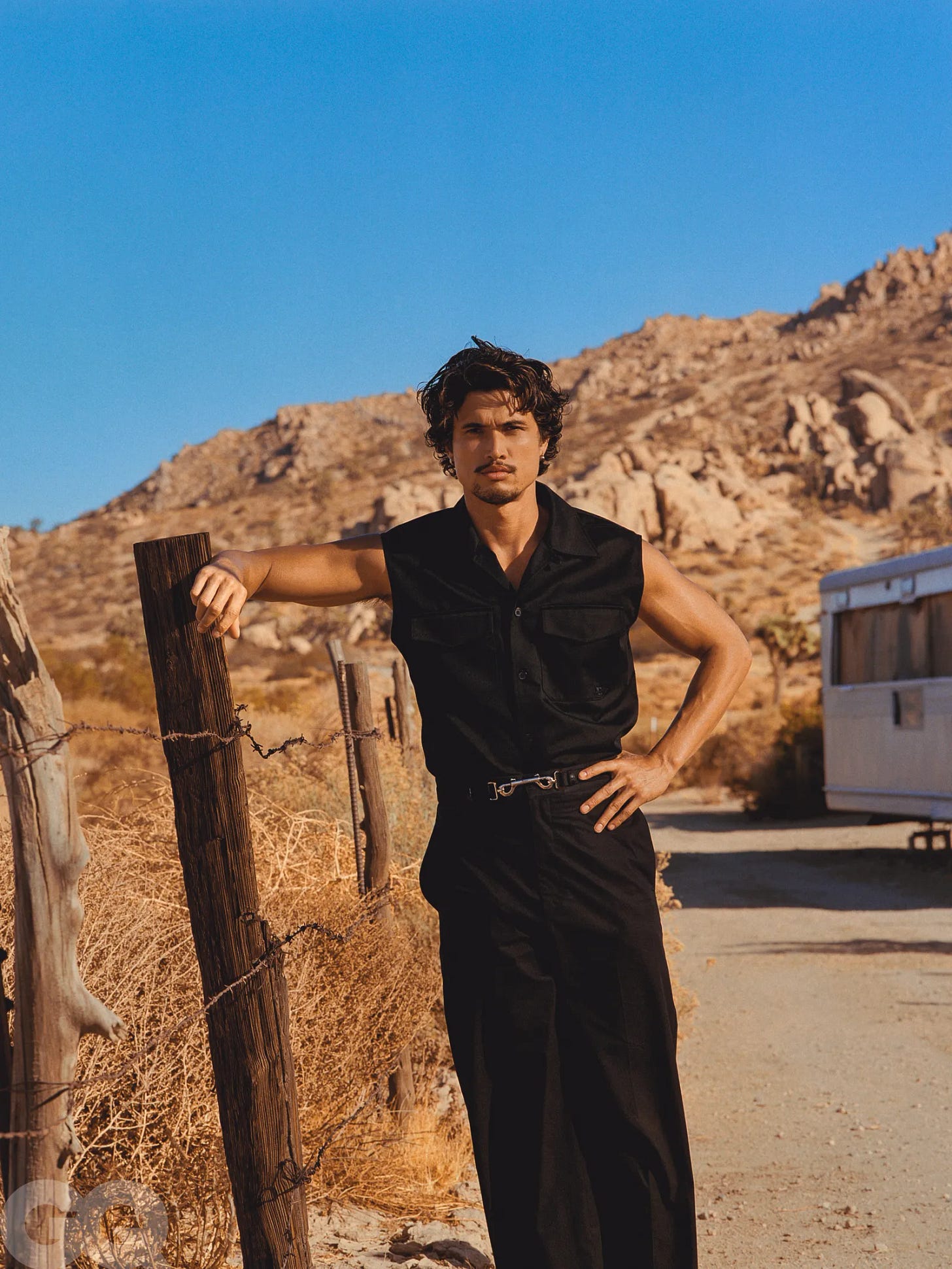A couple weeks ago, I saw a screening of Vox Lux followed by a Q&A from Brady Corbet.1 I hated Vox, as Brady and Mona call it, when it came out, but I have always attributed my dismissal to watching it in the middle of the day on my television. I never thought I would like it, though, because the sandboxing of “America” through a school shooting was a little offensive to my 2018 woke brain. Contrasted with Red Rooms, an indulgence of poor taste to formally match the culture its critiquing, however, I am still offended by it; it is a hilarious and genius premise for a school shooting survivor to become a bad pop star, but elements of how it is executed are far too callous about femininity. Brady Corbet is funny and talented, but he thinks every era and event and topic in history is of equal weight and open to provacateuring. Pop music and the domesticity of Childhood of a Leader are fair game, but the affective reasoning of colonizing the Middle East and children being mowed down by assault rifles aren’t, really.

Yet, I absolutely loved Vox Lux this time around. Saying “America is so stupid and unhappy” with the film’s material—contrasting the rise of Ally Maine from a school shooting to the erection of One World Trade from decades of senseless, cultural, literal violence—seems an impossible task that Corbet (and Lol Crawley) achieve with flying colors. I was even kinder to the film after listening to the Big B talk about its final scene of the concert, too, which he described as “going on and on and on” in “terrible taste.”2 He’s eccentric and super young, really funny, and completely obsessive about contemporary problems and the way things feel right now.
My boyfriend and I were trying to come up with a list of other Americans making truly provocative films about the contemporary, largely and/or unevenly dismissed by “film twitter,” etc. because of their vulgarity, and all we could come up with is Lena Dunham and Ari Aster.3 What I appreciate about these people is their disregard for the crassness of their careers; Aster, for example, could easily be making period pieces. Instead, he makes positively weird and compulsive movies about contemporary Americanness. There are other people, too, who are interested in phones in just the right way: Halina Reijn, Sean Baker, maybe even James Gunn who uses form and money to be relentlessly tongue in cheek. But I’ve been thinking: if these are the truly modern filmmakers, who are the truly modern writers?
One of the first people to come to mind is Alexandra Romanoff. She came out of nowhere, recommendations for her first novel (for adults) Big Fan trickling down to me from friends of friends. That book was my favorite of last year, a zingy, almost short story about a grown up former fan of a fictionalized version of One Direction falling in love with one of its grown up heartthrobs. This seems so simple and so dumb, and it is. But, unlike dumb contemporary books by Taylor Jenkins Reid, Colleen Hoover, Emily Henry, or Robinne Lee, which claw at severity through misinformed and capitalist subplots about femininity, Big Fan embraces its roots in fanfiction while extending its branches toward bigger generic and formal risks.
Square Waves, Romanoff’s followup out June 24, is more of the same, if not a little sweeter and sweatier. Big Fan is essentially Harry Styles fanfiction, if Harry Styles aged into being a Josh Hartnett type with a fashion brand. The lady protagonist is a DC political strategist who hates her job because she’s normal, and whose political husband cheated on her with a new age Monica Lewinsky. The protagonist of Square Waves is this Monica Lewinsky character, “Cassidy” (yes!), who in the first few pages drifts from DC to her home in The Bay, promptly having sex with her high school bully.
Romanoff is so smart, so jaded, so woke (in the good way), that when Cassidy orgasms from penetration just as the book opens, you can’t help but smile. Her high school bully is “Leon” who I am picturing as Charles Melton, a kind of loser who’s kind of mean and really hot. Big Fan opens and closes a hundred different doors leading to or from love—fame, idolization of men, feminine disillusionment, money—and Square Waves hardly opens any. Over a couple hundred pages, Cassidy and Leon brush flesh and fuck and share meals, but not much else happens. It’s both lazy and nervous, as Cassidy and Leon are characterized, but completely satisfying as pornographic wish fulfillment for politically and sexually self-realized adults.
“Pornographic” refers to sex scenes, yes, of which Romanoff is my favorite writer of all time. But it also describes the bluntness of the book’s narration and romantic ideology. Cassidy has been ostracized for a broadly publicized sexual scandal, yet her world—like mine—is so buzzy with streams of information and insecurity we’re all fed, so this trauma is just background. There is also an ease with which Romanoff approaches this sort of heaviness and plot point; there is no originality without severity, but there is no book if she lingers too long on how, like, a sex scandal with Anthony Weiner4 would actually erode a young person’s selfhood. Cassidy has hang ups—namely that Leon has no professional drive—but she has no trouble finishing or chasing after Leon. This is what I like the most about Romanoff: airtight self-awareness about the culture conditions her writing responds and contributes to, creating fantasy out of boredom.

It’s even more charming to me that these books are published by what I have previously called a “font-adjacent, new publisher that calls itself a ‘modern romantic fiction company’ and has spent an unthinkable amount of money on merchandise” which, of course, I have already spent many tens of dollars on. It would be so easy to reject 831 Stories, whose logo is scrawled in swirly-whirly West Village junk store cursive and which launches texts as “book universes.” But, unfortunately for the doomed project of subaltern art distribution and fortunately for the industry of public relations, they make fake merch for the fake celebrities in the books and it’s really cute and well made. I love this brand. I am loyal to this brand.
This might make me like one of the people who cheer at the sight of A24’s logo, but so be it; A24 makes good merchandise, too, and champions better movies than other “distributors.” They are shark-like in their acquisitions of film texts and awards and I appreciate its synthetic new world, old world approach to entertainment.
In that vein: it’s hard not to compare Square Waves to Materialists, its contemporary—down to the week—in pulpy romance about falling in love with hot, American, loser dudes. I reviewed Materialists recently, which I thought was smart about money and violence, not worth any virulent hoopla. I feel similarly about Square Waves, a warm bath of sex and masculine affirmation, totally impervious to any balking, at all. The difference is, however, that I don’t need Celine Song to make any more romcoms, because she made one and it was fine but didn’t have much sex, at all. I wish, on the other hand, that Alexandra Romanoff would write a book a year for the rest of my life, so I never grow hungry for the witty, grotesquely horny but standardized answers to my many cultural questions and conditions. And I want 831 to make more merch for those books, and to host more events.
And isn’t this the American way? “Beach read” this, “beach read” that: 831 books are true beach reads as that genre was initially conceived. Yet I also find Romanoff’s books, specifically, inspiring. Totally cut and dry about “what women want,” a tongue and cheek, heterosexual, sexed up rebuttal to contemporary romantic objects that try to overcomplicate things. I feel invigorated after finishing Square Waves this holiday weekend, ready to fuck Charles Melton or—more likely—reclaim my selfhood as a woman who loves all hot men.

(and Mona Fastvold and Daniel London, the star of Corbet’s short that screened before the feature)
It’s never been clearer that the Guy Pearce stuff in The Brutalist is broadly comedic, and also that Big B’s understanding of our current world as “at the end of history” is the result of opening books, histories, theories and never finishing them. He should stay in the contemporary, because that story hasn’t ended yet; it’s perfectly appropriate for him to, in his own words, “not make propaganda” or “give answers” to problems of 21st century individualism.
Bradley Cooper might fit in that list, too, as he is literally the 2020s Gene Kelly, passively obsessed with the way American men act, but people behave as though he is some unprecedented offense to the medium.
One of my most common NYC celeb sightings.




Here to applaud "swirly-whirly West Village junk store cursive" !!!
Love reading this the day after I bought Big Fan! Can't wait to dive in. Perhaps this is a sign that I should re-watch Vox Lux... I also hated it upon first viewing.